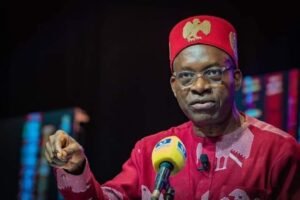
When Governor Charles Chukwuma Soludo stepped onto the stage at The Platform on June 12 last year, he wasn’t just another guest speaker; he was a man on a mission. Nigerians had grown weary of political speeches that said plenty but meant little. What Soludo delivered that day was neither vague optimism nor rehearsed soundbites—it was a carefully balanced act of honesty, intellect, and courage.
It wasn’t the kind of speech designed to win applause from political allies. It was designed to provoke thought. And provoke it did.
“Nigeria is like a vehicle with a leaking tank,” he said, locking eyes with a nation desperate for solutions. “No matter how much fuel you pour, it will keep leaking until we stop the holes.” With that one sentence, Soludo set the tone for what became one of the most talked-about speeches of 2024.
Unlike many of his contemporaries, Soludo didn’t hide behind political correctness. He took on sacred cows with the calmness of a seasoned reformer. His position on full local government autonomy challenged decades of assumed wisdom. To him, simply granting autonomy without addressing structural inefficiencies was like giving a drunken man more credit at the bar. “True federalism,” he argued, “means responsibility, not just rights.”
Yet it wasn’t just his intellectual sharpness that won him praise; it was his ability to speak truth without bitterness. At a time when blame games dominated national discourse, Soludo refused to take the easy path. “President Tinubu did not cause the problem,” he declared. “It took more than 10 years of bad choices to get to this predictable sorry state. Now, the president has the historic duty to mobilise Nigerians to clean up the mess.”
In a political environment where many see honesty as weakness, Soludo’s words felt like fresh air breaking into a suffocating room.
But perhaps the defining moment of that address, the one that traveled farthest beyond the conference hall, was his challenge to elected officials: let those who make laws for the people live on the same minimum wage as the people. “If we want credibility in leadership, we should taste the same hardship as the people we govern,” he said. In that moment, Soludo wasn’t just speaking economics or politics—he was speaking empathy, raw and undeniable.
The reaction was immediate and unmistakable. Commentators described the speech as “firm yet optimistic,” a delicate balance that few Nigerian politicians have been able to achieve. Across radio shows, newspaper editorials, WhatsApp forums, and social media platforms, one theme echoed again and again: Soludo had spoken like a patriot, not a politician.
Now, as he prepares to speak again today, the expectations are different—not lower, not necessarily higher, but weightier. The hunger in the land is sharper. Inflation has bitten harder. Trust in leadership continues to thin like old cloth. Nigerians are not just waiting to hear elegant analysis; they are waiting for direction. If last year’s speech diagnosed the ailment, many are hoping that today’s will prescribe the cure.
That is why the mood feels different this year. Soludo, through the clarity of his voice, has become more than just a governor of a southeastern state. He has become, to many, the conscience of a broken federation—a man unafraid to say, “This house is leaking,” while others pretend the rain is seasonal.
What he brings to the podium today could ripple far beyond the event itself. The nation is listening, not because of fanfare, but because, in a space crowded with noise, Soludo has managed to sound like the voice of reason.
The question hanging, like morning mist over a restless city, is whether this voice will remain that of a regional leader or begin to grow into something larger. Whatever happens, when Soludo speaks today, it won’t be just a speech. It will be a test of leadership before a nation that desperately wants to believe again.
And in the words he left behind last year, perhaps we find a clue to what’s needed now more than ever: “Nigeria will not change until the people decide that enough is enough.”
Today, once again, they will be listening.



